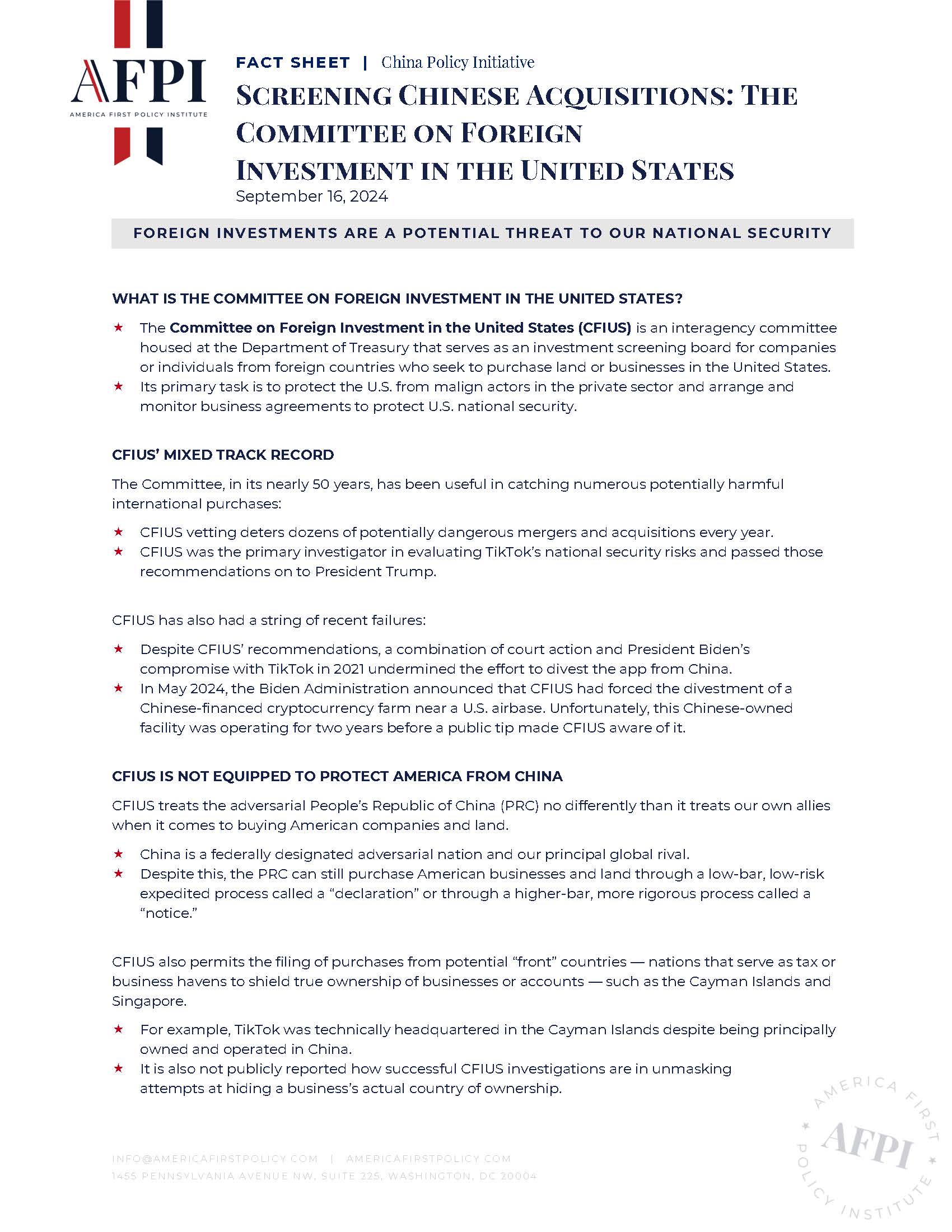Screening Chinese Acquisitions: The Committee on Foreign Investment in the United States
FOREIGN INVESTMENTS ARE A POTENTIAL THREAT TO OUR NATIONAL SECURITY
WHAT IS THE COMMITTEE ON FOREIGN INVESTMENT IN THE UNITED STATES?
- The Committee on Foreign Investment in the United States (CFIUS) is an interagency committee housed at the Department of Treasury that serves as an investment screening board for companies or individuals from foreign countries who seek to purchase land or businesses in the United States.
- Its primary task is to protect the U.S. from malign actors in the private sector and arrange and monitor business agreements to protect U.S. national security.
CFIUS’ MIXED TRACK RECORD
The Committee, in its nearly 50 years, has been useful in catching numerous potentially harmful international purchases:
- CFIUS vetting deters dozens of potentially dangerous mergers and acquisitions every year.
- CFIUS was the primary investigator in evaluating TikTok’s national security risks and passed those recommendations on to President Trump.
CFIUS has also had a string of recent failures:
- Despite CFIUS’ recommendations, a combination of court action and President Biden’s compromise with TikTok in 2021 undermined the effort to divest the app from China.
- In May 2024, the Biden Administration announced that CFIUS had forced the divestment of a Chinese-financed cryptocurrency farm near a U.S. airbase. Unfortunately, this Chinese-owned facility was operating for two years before a public tip made CFIUS aware of it.
CFIUS IS NOT EQUIPPED TO PROTECT AMERICA FROM CHINA
CFIUS treats the adversarial People’s Republic of China (PRC) no differently than it treats our own allies when it comes to buying American companies and land.
- China is a federally designated adversarial nation and our principal global rival.
- Despite this, the PRC can still purchase American businesses and land through a low-bar, low-risk expedited process called a “declaration” or through a higher-bar, more rigorous process called a “notice.”
CFIUS also permits the filing of purchases from potential “front” countries — nations that serve as tax or business havens to shield true ownership of businesses or accounts — such as the Cayman Islands and Singapore.
- For example, TikTok was technically headquartered in the Cayman Islands despite being principally owned and operated in China.
- It is also not publicly reported how successful CFIUS investigations are in unmasking attempts at hiding a business’s actual country of ownership.
Data from the most recent CFIUS report covering 2022 included the following troubling findings:
- Chinese companies have a pattern of evading scrutiny from Chinese regulators by fleeing to countries such as Singapore. Singapore is the headquarters for Shein, a company founded in China with extensive PRC ties and management. TikTok parent company, ByteDance, is headquartered in Beijing and incorporated in the Cayman Islands, while TikTok itself is headquartered in Singapore.
- One-quarter (83 of 286) of all high-bar “notice” purchases submitted to CFIUS were from China, Singapore, and the Cayman Islands.
- The fact that these countries are so heavily represented is extraordinary, considering that Singapore has a lower annual GDP than the state of Missouri, and the Cayman Islands has a lower GDP than any U.S. state.
CHINA EXPLOITS SENSITIVE SECTORS OF OUR ECONOMY
Further concern is warranted when examining the potentially sensitive sectors in which CFIUS purchases take place.
- Of the 266 “notice” purchases in 2022, 66 were in professional and technical services (a category that includes engineering firms, scientific research, and computer systems design), 30 were in electronics manufacturing, and 24 were in utilities.
- The same holds for “declarations” purchases. Of 154 “declarations,” 25 were in professional and technical services, 18 were in utilities, and 14 were in electronics manufacturing.
The purchase of companies in these sectors by foreign adversaries, particularly China, opens significant security vulnerabilities.
- Allowing foreign adversaries to control America’s electronics manufacturing sectors, professional and technical services, and utilities is not in the national interest.
RECOMMENDATIONS
- CFIUS must adopt a list of countries of concern, informed by the Department of Commerce, Department of Defense, or both. This should include lists such as 15 CFR § 7.4, managed by the Department of Commerce, which includes the following nations and regimes:
- The People’s Republic of China, including Hong Kong
- The Republic of Cuba
- The Islamic Republic of Iran
- The Democratic People’s Republic of Korea (DPRK)
- The Russian Federation
- The Republic of Venezuela under the control of Nicolás Maduro
- China and other nations that might be identified as fronts for buying American companies with foreign capital should be restricted from using the low-bar “declarations” process.
- True company ownership and capital origin must always be determined before a purchase is approved.
- Any potential commercial acquisitions of American businesses by a hostile nation or its citizens should receive increased scrutiny.
- Data and onshoring requirements should be aggressively enforced through civil and criminal penalties.
- The Committee should assess every purchase with a presumption of denial.
For more, read AFPI’s research report “Optimizing Investment Guardrails: The Challenge of Protecting U.S. Companies, Data, and Infrastructure from the CCP.”
